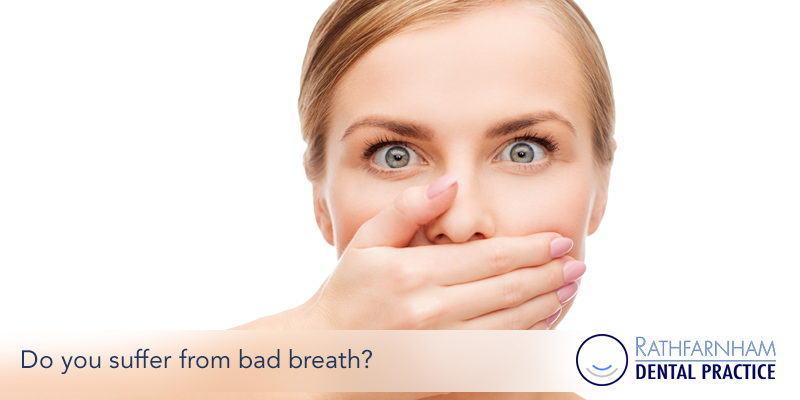Bad breath, also known as halitosis, is unpleasant and often embarrassing. It can result from dental disease or poor dental hygiene, diet and lifestyle habits or can be a sign of other general health problems. If you suffer from bad breath, please discuss this with one of the dentists at Rathfarnham Dental Practice. We can assess your mouth, lifestyle and medications and advise you on ways to improve your situation.
What causes bad breath?
Dental disease and poor oral hygiene
The odour forming bacteria which cause bad breath will build up in the presence of plaque, calculus and food debris on your teeth, gums or tongue. Tooth decay, untreated gum disease and dental infection also cause an increase in these bacteria.
Diet and lifestyle habits
All foods we eat are absorbed into our bloodstream following digestion. Ultimately, they are carried to our lungs and can be smelt on our breath. Foods that have strong odours, such as garlic and onions are particularly strong offenders.
If you brush or use mouthwash, you will just cover these odours temporarily. The smell will finally resolve once the foods have passed through your system.
Smoking is a typical cause of bad breath. Smoking will stain your teeth, reduce your ability to taste food and lead to gum disease, as well as other serious health problems.
Underlying health problems
Persistent bad breath may be a sign of health problems beyond your mouth. Some of these include stomach acid reflux, post nasal drips, chronic sinusitis, salivary gland disease, diabetes and autoimmune disorders.
If you have a dry mouth it will give you bad breath because you have no saliva to cleanse and moisten your mouth. Dry mouth can be a sign of dehydration due to lack of water intake, too much caffeine or alcohol. Many common medications have the side effect of reducing saliva.
Tips for preventing and treating bad breath
1. Consult with one of the dentists at Rathfarnham Dental Practice for best advice.
2. Brush twice a day and clean between your teeth every night using floss or interdental brushes. For certain patients, mouthwash is also advised. Use a tongue scraper once day to remove bacterial deposits.
3. Review your dietary and lifestyle habits and discuss your options with your dentist.
4. Stay hydrated with water.
5. Keep up to date with regular Hygienist visits at the intervals prescribed for you by the dentist.

